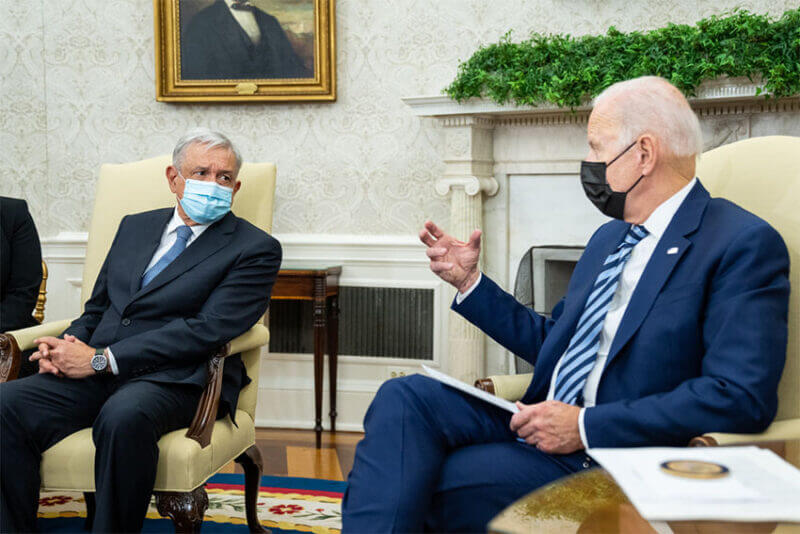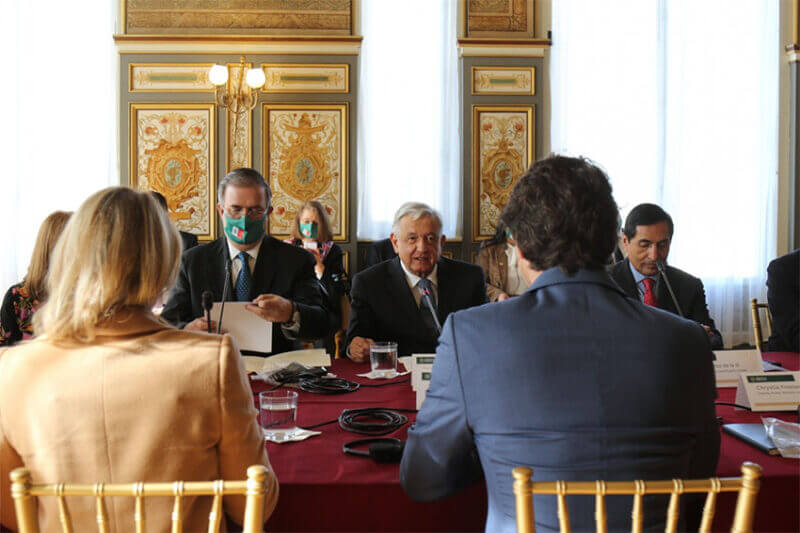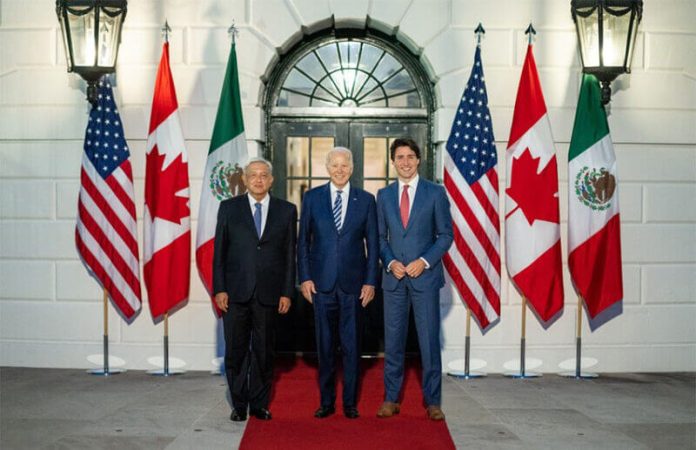President López Obrador called for an end to the rejection of migrants and a strengthening of the integrated North American economy in public remarks to United States President Joe Biden and Canadian Prime Minister Justin Trudeau at Thursday’s North American Leaders Summit in Washington D.C.
Speaking in the East Room of the White House, López Obrador said the United States and Canada need to put aside “myths and prejudices” and stop rejecting migrants. Turning them away doesn’t make sense because the United States and Canada lack workers and an ample workforce is needed for economic growth, he asserted.
“Why not study the demand for labor and open migration flows in an orderly way?” he said.
Earlier in his remarks, López Obrador said economic integration is “the best instrument to face up to the competition derived from the growth of other regions of the world, particularly the productive and commercial expansion of China.”
He said China’s share of the global market has increased from 1.7% to 14.4% over the past 30 years whereas the combined market share of the United States, Mexico and Canada declined from 16% to 13%.
“If the trend of the past decade is maintained, in another 30 years, by 2051, China will control 42% of the global market and the United States, Mexico and Canada will be left with 12%, which in addition to being an unacceptable disproportion in the economic sphere, would keep alive the temptation of betting on the use of force to resolve this disparity, which would endanger all of us. That’s why the best, most convenient thing [to do] is to strengthen our economies, strengthen ourselves commercially in North America and the entire continent,” López Obrador said.
He said North America is not producing enough to be self-sufficient, forcing it to import goods from outside the region.
“… The Pacific ports are saturated with goods from Asia. … Why can’t we produce in North America what we consume? Of course we can. It’s a matter of defining a regional economic strategy,” López Obrador said.
Following the summit, the “three amigos,” as the Mexican, U.S. and Canadian leaders are colloquially known, issued a joint statement that at least partially addressed the issues López Obrador raised.
“The complex factors causing an extraordinary increase in irregular migration throughout the hemisphere underscore the need for bold regional cooperation,” they said.

The leaders said they will work together to address the challenge and affirmed their commitment to adopt “an ambitious and comprehensive approach to safe, orderly, and humane migration management.”
“Our vision is to strengthen and expand access to protection for refugees, asylum seekers, and vulnerable migrants throughout the region,” they said.
“This includes opportunities to access localized protection pathways, integration programs, and support for the most at-risk groups, including internally-displaced persons and human smuggling and trafficking victims. We can help people find safety and sustainable livelihoods within their own countries, prevent their exploitation and combat their stigmatization due to xenophobia and racism,” they said.
“We also commit to strengthening opportunities for legal pathways for migrants to enter our respective countries, whether for seasonal and temporary work, family reunification, or humanitarian protection, including through resettlement.”
The leaders also affirmed their commitment to address the root causes of migration.
In a bilateral meeting with López Obrador, Biden committed to investing in the Sembrando Vida (Sowing Life) tree-planting employment program in the south of Mexico but no dollar figure was announced. The United States had already agreed to collaborate with Mexico on employment programs in the southern region of the country and in Central America. The programs’ central aim is to provide opportunities that dissuade people from heading to the United States.
Foreign Minister Marcelo Ebrard said after the summit that the United States would invest in a program in southern Mexico and Central America that will probably be called Sembrando Oportunidades (Sowing Opportunities).
“We’re going to be working with the United States agencies in the coming days but the most important thing is that there is a response to what President López Obrador has been suggesting in relation to migration,” he said.
With regard to economic integration, López Obrador, Biden and Trudeau declared that Mexico, the United States and Canada are together an “economic powerhouse,” but acknowledged they can’t rest on their laurels.
“ … For our economies to remain competitive and to propel our future growth, we need to create the right conditions for businesses and workers to thrive. Good regulatory practices, strong labor rights protections, a safe, secure, and reliable cyber ecosystem, predictability in trading relations, strong critical infrastructure, high environmental standards and a continuous dialogue with diverse stakeholders are key priorities,” the leaders said.
Their “highest priority,” they said, was managing and ending the COVID-19 pandemic and driving “a green, equitable, and inclusive economic recovery.”
“Our vision is to support sustainable growth, resilient infrastructure, build upon the foundation established by our trade agreement to protect workers’ rights, and actively promote gender, racial, ethnic, and social equity to unlock the region’s tremendous human capital,” the leaders said.

“… To ensure that we are ready to face the next pandemic and other health threats, we will look at ways to shore up our medical supply chains, improve global vaccine distribution, support global health security, invest in our health workforce, and combat counterfeit medications. We will also work together toward the recognition of COVID-19 vaccines deemed safe and efficacious by the WHO [World Health Organization] to ensure safe and secure mobility in the region.”
In addition to the coronavirus pandemic and an opioid crisis in the United States and Canada, López Obrador, Biden and Trudeau said that North America is “experiencing a public health epidemic of gun violence, in part due to the diversion of firearms into illegal markets.”
“For example, hundreds of thousands of firearms cross into Mexico annually, empowering transnational criminal organizations and generating irreversible damages to society,” they said.
“To address these issues, and protect our communities from harms emerging from the global illegal drug environment and firearms trafficking facing North America, we need a collective, coordinated approach. We commit to continue addressing these issues via venues like the North American Drug Dialogue in 2022 and beyond.”
The Mexican government is currently pursuing legal action against U.S.-based gun manufacturers, accusing them of negligent business practices that have led to illegal arms trafficking and deaths in Mexico, where U.S.-sourced firearms are used in a majority of high-impact crimes. Foreign Minister Ebrard said in September that reducing violence in Mexico will be very difficult if the United States doesn’t do more to stop the illegal flow of weapons into the country.
In their joint statement, the three leaders also committed to “taking swift and coordinated action to fight climate change, which increasingly jeopardizes our prosperity.”
Speaking at a press conference after the summit, Ebrard said that López Obrador had expressed gratitude to Biden for his plan to regularize the status of millions of migrants who are in the United States illegally. He said the president also thanked his U.S. counterpart for reopening the land border between the two countries and donating COVID-19 vaccines to Mexico.
Ebrard said López Obrador spoke with U.S. and Canadian officials about reforms his government is undertaking but energy – including a constitutional bill that seeks to overhaul electricity market rules – was not a major discussion point.
United States lawmakers, the governor of Texas and and business organizations in the U.S., Canada and Mexico raised concerns about Mexico’s energy policies and plans on the eve of the leaders’ summit, arguing that they violate USMCA provisions and would adversely affect U.S. and Canadian companies.
“The energy reform wasn’t touched upon,” Ebrard said before conceding that “the president did mention it” when speaking about a range of reforms the Mexican government is pursuing.
“The argument of the president is essentially that the current [energy market] model is not sustainable, it’s very expensive, it means growing subsidies [for private companies]. But [energy] wasn’t a central issue…” he said.
Cuba was apparently not a central issue either. A high-ranking U.S. official said that Biden planned to ask López Obrador and Trudeau to join forces with the U.S. to demand that the Cuban government respect those who are seeking greater freedoms in the Caribbean island nation. Such a request had the potential to irk López Obrador, who has indicated his support for the Cuban government on repeated occasions and hosted President Miguel Díaz-Canel as a guest of honor at this year’s Independence celebrations.
But there was no mention of Cuba in the leaders’ joint statement and none of them referred to the nation in their public remarks.
Thursday’s summit was the first since 2016, when Enrique Peña Nieto and Barrack Obama were hosted by Trudeau in Ottawa. The “three amigos” will next meet in Mexico City in 2022.
With reports from El Universal, Reforma and Milenio
